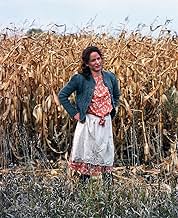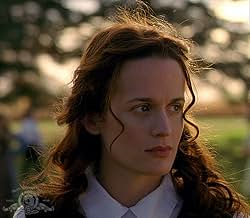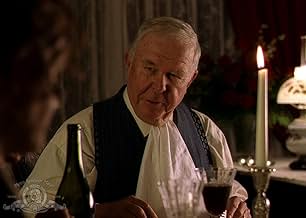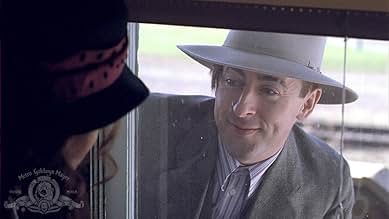VALUTAZIONE IMDb
7,1/10
4294
LA TUA VALUTAZIONE
Aggiungi una trama nella tua linguaIn 1920, Inge, a German national, travels from Norway to rural Minnesota for her arranged marriage to Olaf, a Norwegian farmer; bureaucracy and prejudice cause major complications.In 1920, Inge, a German national, travels from Norway to rural Minnesota for her arranged marriage to Olaf, a Norwegian farmer; bureaucracy and prejudice cause major complications.In 1920, Inge, a German national, travels from Norway to rural Minnesota for her arranged marriage to Olaf, a Norwegian farmer; bureaucracy and prejudice cause major complications.
- Premi
- 9 vittorie e 2 candidature totali
Recensioni in evidenza
This is the story of a German mail order bride who moves to a small, Minnesota town filled with Norwegians who don't exactly embrace difference.
The movie creates a palatable tension between doing what you need to do to fit in with your community (what you're "supposed" to do) and finding love with someone who is different (what you should do).
That message resonates in today's political climate.
A funny, poignant, wonderfully acted movie, Sweet Land has the confidence to treat us as if we are intelligent. It lets us fill in the blanks and trusts us to understand what's going on without telling us everything. While this makes us work a little rather than sit back and be spoon fed the entertainment, the effort is well worth it.
For example, when characters speak German, instead of using subtitles, the filmmakers know we'll get the gist of the scene - even though we don't get the exact verbiage. Selim lets the emotion carry us and it works. This is delicate work but it's handled with care and talent.
Sweet Land is about how love is stronger than fear.
Very, very good movie...the kind they don't make in Hollywood. I'd compare it to Jean de Florette and the sequel Manon of the Spring. It's a simple story with complex emotions where the smallest details, like someone taking a huge bite of potatoes, say a lot.
Excellent movie.
The movie creates a palatable tension between doing what you need to do to fit in with your community (what you're "supposed" to do) and finding love with someone who is different (what you should do).
That message resonates in today's political climate.
A funny, poignant, wonderfully acted movie, Sweet Land has the confidence to treat us as if we are intelligent. It lets us fill in the blanks and trusts us to understand what's going on without telling us everything. While this makes us work a little rather than sit back and be spoon fed the entertainment, the effort is well worth it.
For example, when characters speak German, instead of using subtitles, the filmmakers know we'll get the gist of the scene - even though we don't get the exact verbiage. Selim lets the emotion carry us and it works. This is delicate work but it's handled with care and talent.
Sweet Land is about how love is stronger than fear.
Very, very good movie...the kind they don't make in Hollywood. I'd compare it to Jean de Florette and the sequel Manon of the Spring. It's a simple story with complex emotions where the smallest details, like someone taking a huge bite of potatoes, say a lot.
Excellent movie.
'Sweet Land' manages a difficult feat: it is a historical film with a clear message for the present, yet it avoids becoming either nostalgically cloying or preachily shrill. "Banking and farming don't mix" is not merely a phrase heard several times; it is the key to the confrontation of two utterly different, and utterly irreconcilable, attitudes toward land and life. Ned Beatty, as the chief banker, embodies the one, driven by money and power, harshly and repellently (it's a superb performance), but he and his few allies, and what they stand for, cannot completely overwhelm what most of the other characters, major and minor, believe in and represent: the importance of human connections, with each other and with the jobs they must carry out.
There is scarcely a false step in this film. Elizabeth Reaser brings Inge to life completely believably and very poignantly. We truly care about this woman, a fact made all the more astonishing when we realize that for a sizable part of the film she speaks in languages most of the American audience will not understand. It's one of the best performances I've seen in a long time. Similarly convincing is Tim Guinee as Olaf, her perplexed husband-to-be. His struggles to overcome prejudice (his own and that of his neighbors) are played with a delightful mix of humor, pathos, and inner strength which mirror the complex set of forces with which he must deal. Much the same could be said, albeit on a smaller scale, of the lesser parts; these performers inhabit these roles as if they had already lived them for real. Watch the interactions between Alan Cumming and Alex Kingston, for example; these are two people who are deeply and genuinely in love, but who recognize and accept the flaws of the other. There is no conventional 'happy marriage' insipidity here-- with the result that their marriage comes across as truly happy in a far more profound manner than so many others on screen.
Visually the film is often lovely. It is not as lusciously filmed as Terrence Malick's 'Days of Heaven', with which it shares an underlying approach, but it also avoids the occasional glossiness which undercut the down-to-earth elements of the earlier film's plot. Here the images rarely feel forced, and never overwhelm the intense sense of physical presence so vital to both plot and message. Also powerful is the use of two framing stories, linked to but not dependent upon the central plot. Indeed, the emotional climax of the film actually resides in the contemporary story, something we will not realize until almost the very end of the film. What seems a mere narrative trick suddenly resonates with tremendous power, and brings home the film's central theme beautifully yet without undue emphasis.
The flaws are few. The music, usually vaguely folksy without being especially engaging, is more than once rather too modern in its feel and too diffuse in its impact to support the visuals. The music is the weakest element in the film; at times it sounds almost as if the decision to add music was taken so late in production that all that was possible was some improvisational doodling, which fits neither the delicately shaped mood nor the careful pacing and structuring of the action. The important part of Minister Sorrensen is a bit awkwardly written, with his changes of outlook being rather too sudden; John Heard's performance, though thoughtful, could likewise be more nuanced (he was probably responding to the part as written, but in this case he would have been better off to play against the script).
'Sweet Land' is a beautiful, funny, and often very moving film, with a deep and respectful sense of history and human relations. Both the action and the thoughts it provokes will linger long after the curtain closes. The film has much to offer, and I recommend it very highly.
There is scarcely a false step in this film. Elizabeth Reaser brings Inge to life completely believably and very poignantly. We truly care about this woman, a fact made all the more astonishing when we realize that for a sizable part of the film she speaks in languages most of the American audience will not understand. It's one of the best performances I've seen in a long time. Similarly convincing is Tim Guinee as Olaf, her perplexed husband-to-be. His struggles to overcome prejudice (his own and that of his neighbors) are played with a delightful mix of humor, pathos, and inner strength which mirror the complex set of forces with which he must deal. Much the same could be said, albeit on a smaller scale, of the lesser parts; these performers inhabit these roles as if they had already lived them for real. Watch the interactions between Alan Cumming and Alex Kingston, for example; these are two people who are deeply and genuinely in love, but who recognize and accept the flaws of the other. There is no conventional 'happy marriage' insipidity here-- with the result that their marriage comes across as truly happy in a far more profound manner than so many others on screen.
Visually the film is often lovely. It is not as lusciously filmed as Terrence Malick's 'Days of Heaven', with which it shares an underlying approach, but it also avoids the occasional glossiness which undercut the down-to-earth elements of the earlier film's plot. Here the images rarely feel forced, and never overwhelm the intense sense of physical presence so vital to both plot and message. Also powerful is the use of two framing stories, linked to but not dependent upon the central plot. Indeed, the emotional climax of the film actually resides in the contemporary story, something we will not realize until almost the very end of the film. What seems a mere narrative trick suddenly resonates with tremendous power, and brings home the film's central theme beautifully yet without undue emphasis.
The flaws are few. The music, usually vaguely folksy without being especially engaging, is more than once rather too modern in its feel and too diffuse in its impact to support the visuals. The music is the weakest element in the film; at times it sounds almost as if the decision to add music was taken so late in production that all that was possible was some improvisational doodling, which fits neither the delicately shaped mood nor the careful pacing and structuring of the action. The important part of Minister Sorrensen is a bit awkwardly written, with his changes of outlook being rather too sudden; John Heard's performance, though thoughtful, could likewise be more nuanced (he was probably responding to the part as written, but in this case he would have been better off to play against the script).
'Sweet Land' is a beautiful, funny, and often very moving film, with a deep and respectful sense of history and human relations. Both the action and the thoughts it provokes will linger long after the curtain closes. The film has much to offer, and I recommend it very highly.
As a total movie addict, I was very surprised after attending a screening of this film to be so overwhelmed by the quality of the photography and the depth of the acting.
The visual images in this film are simple, yet breathtakingly beautiful in their composition. It is a rare masterpiece with amazing use of time, depth and perspective. The development of the romantic tension between the main characters in the love story was so powerful and yet so subtle, that it was like a fresh breath mint on a cold January morning.
The used of time and flashbacks is amazing, and the editing and pace of the movie is very accomplished for an independent, low budget film. I will not be surprised if I hear about this move at Oscar time.
The visual images in this film are simple, yet breathtakingly beautiful in their composition. It is a rare masterpiece with amazing use of time, depth and perspective. The development of the romantic tension between the main characters in the love story was so powerful and yet so subtle, that it was like a fresh breath mint on a cold January morning.
The used of time and flashbacks is amazing, and the editing and pace of the movie is very accomplished for an independent, low budget film. I will not be surprised if I hear about this move at Oscar time.
10Red-125
Sweet Land (2005) was written and directed by Ali Selim. Elizabeth Reaser plays Inge, a mail-order bride who travels to Minnesota to marry Olaf (portrayed by Tim Guinee).
Because Inge is from Germany, not from Scandinavia, she finds social and legal obstacles to her wedding. The plot proceeds from this significant problem.
Tim Guinee is a strong actor, as are some of the actors in supporting roles: John Heard as the troubled Minister Sorrensen, Ned Beatty as Banker Harmo, and Alex Kingston as farm housewife Brownie.
However, the movie belongs to Elizabeth Reaser. She is a brilliant actor. She's even more talented than we realize. She doesn't speak German, but in the film she had to speak German as if it were her first language. Also, she had to speak English with a German accent. Somehow, she carries it off.
It's worth mentioning one aspect of the movie that was unintentionally funny. Reaser has been traveling across the ocean and then halfway across the continent. She arrives looking fresh and tidy. She continues to be fresh and tidy--without a bath--for days after she arrives. Similarly, Alex Kingston is supposed to be a farm housewife who is the mother of nine children, but she still looks youthful and slender. OK--they're beautiful women, but director Selim should have given them a few signs of wear.
I enjoyed this film, and I recommend it highly. We saw the film on DVD, where it worked well. The movie has a strong IMDb rating of 7.3. I think that it's even better than that.
Because Inge is from Germany, not from Scandinavia, she finds social and legal obstacles to her wedding. The plot proceeds from this significant problem.
Tim Guinee is a strong actor, as are some of the actors in supporting roles: John Heard as the troubled Minister Sorrensen, Ned Beatty as Banker Harmo, and Alex Kingston as farm housewife Brownie.
However, the movie belongs to Elizabeth Reaser. She is a brilliant actor. She's even more talented than we realize. She doesn't speak German, but in the film she had to speak German as if it were her first language. Also, she had to speak English with a German accent. Somehow, she carries it off.
It's worth mentioning one aspect of the movie that was unintentionally funny. Reaser has been traveling across the ocean and then halfway across the continent. She arrives looking fresh and tidy. She continues to be fresh and tidy--without a bath--for days after she arrives. Similarly, Alex Kingston is supposed to be a farm housewife who is the mother of nine children, but she still looks youthful and slender. OK--they're beautiful women, but director Selim should have given them a few signs of wear.
I enjoyed this film, and I recommend it highly. We saw the film on DVD, where it worked well. The movie has a strong IMDb rating of 7.3. I think that it's even better than that.
This film is most absorbing, but you have to be willing to watch a film that unfolds slowly. It is magnificently acted with two young actors -- Elizabeth Reaser and Tim Guinee as the leads. There is relatively little dialogue, and much of it is in German or Norwegian with no subtitles, which conveys to the audience the difficulty that they have communicating with each other.
The two leads are heavily dependent upon the expressiveness of their eyes, which they do with great delicacy. The film is well-paced and beautifully photographed. The only difficulty I had was catching on that the action took place in three time periods, not just two. You had 1920 when Inge, a mail order bride comes to rural Minnesota. (The scenery looked authentic, and since some of the credits are for institutions in Montevideo, MN, a town to which I once traveled, I can understand the veracity of the setting.)
The second time period, which is not so clear, is when Olaf, Inge's husband has passed away, and the third time period is more or less the present when Inge's grandson is faced with a decision of whether or not to sell the farm. There are some visual clues to separate the second and third time periods, but they are quite subtle.
The second is probably around 1960, marked by the glasses frames that Inge, as an old woman is wearing; and the third, by a jacket that her great-granddaughter is wearing. Otherwise, the time differences are not totally clear, particularly at the beginning of the film, where you have flashbacks.
The film struck me with its apparent accuracy. Twenty years ago, I knew an elderly Norwegian immigrant who had been the wife of a North Dakota farmer, and she had told me stories of farm life in the 1920s and 1930s. It required about 15 people to operate a steam threshing machine, and she told me about preparing lunch each day during the harvest season for 20 men; and about reading by candlelight at night; using an indoor pump at the sink; and seeking to keep warm during the brutal North Dakota winters.
I visited the woman and her daughters and grand-daughter in her modern apartment which was a far cry from life during her youth. It blows me away to think about the change in this one woman's singular life from her youth to her later years -- greater changes than in any prior period in history. (In 1946, there were still more horse drawn tractors than mechanized ones in use in the U.S., and there wasn't much electricity in rural areas until the New Deal.)
Although I may have missed some, I perceived no wrong notes in the film which added to the enjoyment of watching it. A most charming film from beginning to end.
The two leads are heavily dependent upon the expressiveness of their eyes, which they do with great delicacy. The film is well-paced and beautifully photographed. The only difficulty I had was catching on that the action took place in three time periods, not just two. You had 1920 when Inge, a mail order bride comes to rural Minnesota. (The scenery looked authentic, and since some of the credits are for institutions in Montevideo, MN, a town to which I once traveled, I can understand the veracity of the setting.)
The second time period, which is not so clear, is when Olaf, Inge's husband has passed away, and the third time period is more or less the present when Inge's grandson is faced with a decision of whether or not to sell the farm. There are some visual clues to separate the second and third time periods, but they are quite subtle.
The second is probably around 1960, marked by the glasses frames that Inge, as an old woman is wearing; and the third, by a jacket that her great-granddaughter is wearing. Otherwise, the time differences are not totally clear, particularly at the beginning of the film, where you have flashbacks.
The film struck me with its apparent accuracy. Twenty years ago, I knew an elderly Norwegian immigrant who had been the wife of a North Dakota farmer, and she had told me stories of farm life in the 1920s and 1930s. It required about 15 people to operate a steam threshing machine, and she told me about preparing lunch each day during the harvest season for 20 men; and about reading by candlelight at night; using an indoor pump at the sink; and seeking to keep warm during the brutal North Dakota winters.
I visited the woman and her daughters and grand-daughter in her modern apartment which was a far cry from life during her youth. It blows me away to think about the change in this one woman's singular life from her youth to her later years -- greater changes than in any prior period in history. (In 1946, there were still more horse drawn tractors than mechanized ones in use in the U.S., and there wasn't much electricity in rural areas until the New Deal.)
Although I may have missed some, I perceived no wrong notes in the film which added to the enjoyment of watching it. A most charming film from beginning to end.
Lo sapevi?
- QuizElizabeth Reaser' Norwegian pronunciation was so bad that after Dagbladet (one of Norway's biggest news-papers) stumbled upon this film, they posted a clip from it with the title "What is she trying to say?"
- BlooperThey harvest an entire field of corn between the two of them, when they get back to the barn, the crop is suddenly wheat. They go through the whole "separating the wheat from the chaff" process, and pour the seed into sacks.
- Citazioni
Old Inge: Olaf died, Frandsen.
Old Frandsen: [considering for a moment] No. Olaf is in the fields.
Old Inge: [slowly glancing out the window and remembering]
- Colonne sonoreEskimo Kisses
Music and Lyrics by Thomas Lieberman (as T.F. Lieberman)
Published by Liza Rose Music (ASCAP)
Performed by Thomas Lieberman (as Tom Lieberman)
I più visti
Accedi per valutare e creare un elenco di titoli salvati per ottenere consigli personalizzati
- How long is Sweet Land?Powered by Alexa
- Is "Sweet Land" based on a novel?
Dettagli
- Data di uscita
- Paese di origine
- Sito ufficiale
- Lingue
- Celebre anche come
- Wedding Photo
- Luoghi delle riprese
- Aziende produttrici
- Vedi altri crediti dell’azienda su IMDbPro
Botteghino
- Budget
- 1.000.000 USD (previsto)
- Lordo Stati Uniti e Canada
- 1.706.325 USD
- Fine settimana di apertura Stati Uniti e Canada
- 41.860 USD
- 15 ott 2006
- Lordo in tutto il mondo
- 1.843.537 USD
- Tempo di esecuzione1 ora 50 minuti
- Colore
- Mix di suoni
- Proporzioni
- 1.85 : 1
Contribuisci a questa pagina
Suggerisci una modifica o aggiungi i contenuti mancanti

Divario superiore
By what name was Sweet Land (2005) officially released in India in English?
Rispondi

































